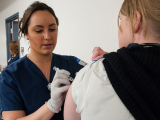Sep 22, 2011 (CIDRAP News) – Almost two thirds of US adults intend to get vaccinated against influenza this season, and 70% of parents plan to have their children vaccinated, according to survey data presented by health officials in Washington, DC, yesterday.
At an annual press conference hosted by the National Foundation for Infectious Diseases (NFID), Tom Frieden, MD, director of the US Centers for Disease Control and Prevention (CDC), said flu activity is at very low levels in the United States so far and that early reports suggest that all three seasonal strains are circulating and are a good match with the strains included in the vaccine for the upcoming season.
He said so far about 90 million doses of flu vaccine have been distributed to outlets such as doctor's offices and pharmacies, with manufacturers expected to produce a record 170 million doses for the upcoming flu season.
Sanofi Pasteur recently began shipping its newly approved intradermal influenza vaccine for adults aged 18 through 64, which raises the number of vaccine types to four, including the standard intramuscular injection, the nasal spray for ages 2 through 49, and a high-dose injectable vaccine for people 65 and older.
William Schaffner, MD, president of NFID and chairman of the Department of Preventive Medicine at Vanderbilt University School of Medicine, unveiled the results of two surveys conducted on flu vaccine perceptions, one on consumers and one on parents. Each was conducted from Aug 11 through Aug 14.
The consumer survey, conducted via telephone by Caravan, included 1,006 adults age 18 and older. The parent survey was self-selected and included 1,000 parents age 18 and older who had children between ages 2 and 17. It was conducted by ORC International.
Schaffner said one finding was that the repeat inclusion of last year's three strains in this season's vaccine doesn't appear to be dampening parents' intent to have their children vaccinated, as 56% said knowing the strains are the same didn't affect their vaccination intentions. For adult consumers in general, 79% said the repeat of the strains will not change their intent to get vaccinated.
According to the surveys, overall interest in vaccines remains high. For parents, 70% said they definitely or probably will get their children vaccinated. For adult consumers, that level was 63%, up from 57% in 2010.
More health providers seem to be encouraging their patients to get vaccinated, Frieden said. The survey found 68% of adults received a recommendation from a health professional this year, up from 58% in 2010.
However, for both survey groups, NFID found that some see annual flu vaccination as optional. For example, 40% of parents said annual flu vaccination was a priority for their children, but 20% said they see it as a decision to make each year.
Of the 36% who said they didn't intend to be vaccinated, more than two-thirds said they could be motivated to change their minds, according to the survey results. The top three factors included seeing a family member or friend get very sick with the flu, receiving a recommendation from a healthcare provider, and receiving reassurance that the vaccine is safe.
The 2010-2011 flu season presents a relatively rare situation in that the three strains in the vaccine are the same as the last season. Repeating flu vaccines strains have occurred eight times in the past 42 years, according to background information from the NFID.
The CDC estimates that 8 million more people received the flu vaccine during the 2010-11 season than were immunized during the previous season, Frieden said.
"But we're not seeing that progress in young adults with underlying medical conditions," he said, noting that only 47% of people aged 18 to 64 who have risk factors for flu complications received the vaccine last year..
This same risk group could also be missing out on getting the pneumococcal vaccine, which can help prevent pneumonia, a potential serious complication of influenza, he said. He estimated that about 73 million people who are targeted for the pneumococcal vaccine—adults 65 and older and those over 18 with certain medical conditions—have not received it.




















